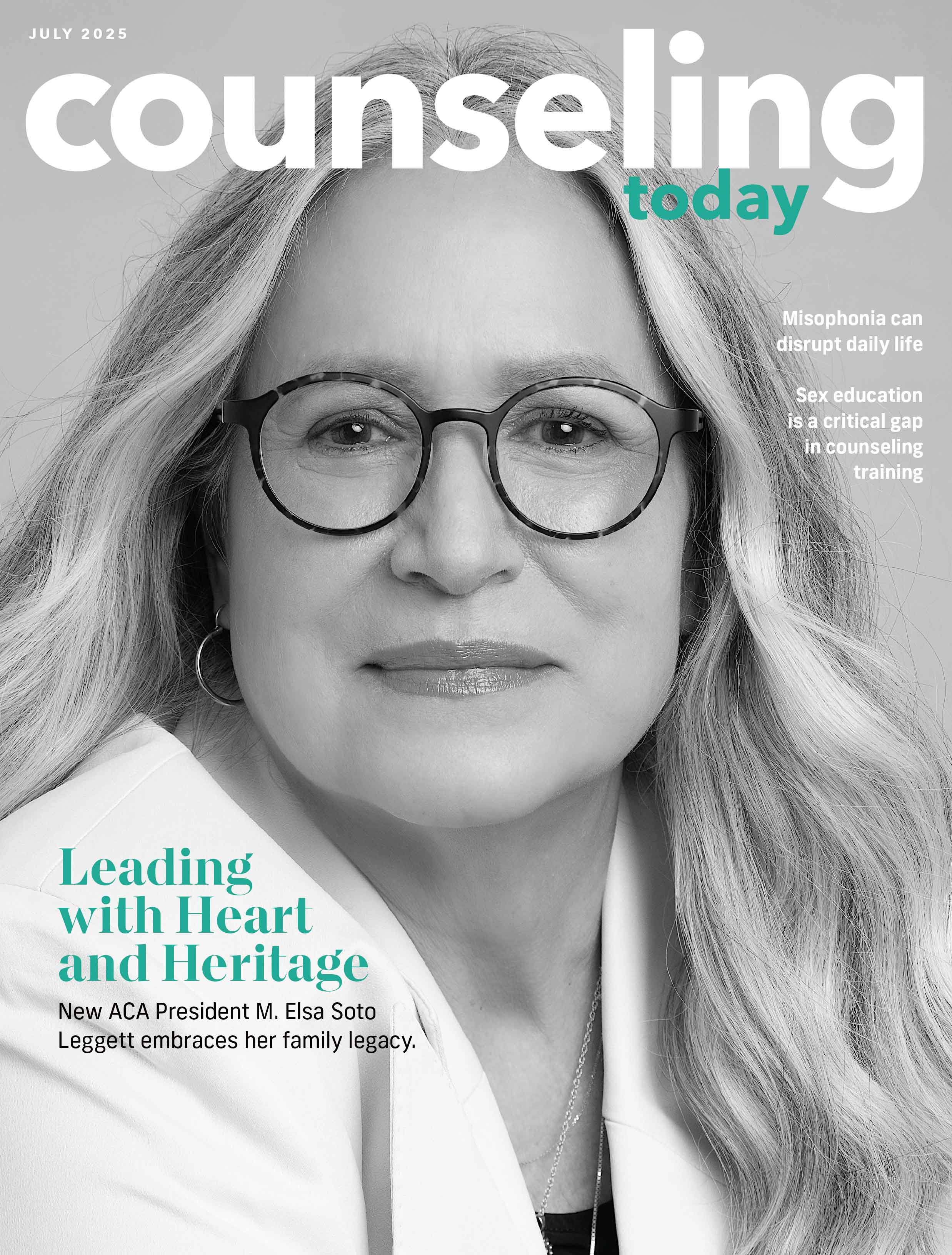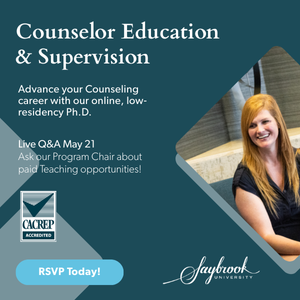Explore Counseling Today Articles
4 steps to refresh, recharge and reconnect
Image by Tiny Tribes from Pixabay
If you are anything like me, you find being a counselor very enjoyable and fulfilling. We regularly make positive impacts on the lives of people we serve, and we’re committed to help them heal and grow.
However, this endeavor can be emotionally demanding and challenging. We hold space for successes, but we also come face to face with various sufferings and human misery. Even an ordinary day can at times be exhausting.
Add in the personal responsibilities of everyday life, living amid a pandemic, daily acts of violence and inflation, and the potential implications can be prevalent and persistent for counselors. These implications include increased depression, anxiety, psychosocial isolation, loneliness, disrupted personal relationships, compassion fatigue, vicarious trauma, burnout and professional impairment, all of which can impact the quality of services for effective and ethical counseling and overall functioning.
While most of us have substantial knowledge about self-care and convey its importance to clients, there is a disconnect between knowing about and doing self-care. For many counselors, self-care is front and center yet so far away.
Defining self-care
What exactly is self-care? Simply put, self-care is intentional actions and experiences to enhance or maintain physical, emotional, mental and social well-being and balance in life.
Self-care has many benefits. It boosts well-being, builds resilience, increases self-awareness and self-esteem, prevents burnout and compassion fatigue, and helps us perform at our best. It is a form of prevention, an ethical responsibility and an imperative for counselors personally and professionally.
Most important, self-care is about choice and understanding what it means for you. Everyone has a unique definition of self-care. For some, it may be a spa day, a massage or weeks of vacation. For others, it may be curling up with a good book, taking a moment to breathe, establishing boundaries, being intentional or assertive, or holding oneself accountable. Self-care is what maintains and restores your sense of self and what nourishes you.
Making self-care routine
It can be challenging to integrate self-care into a daily routine, which is why I created a four-step guide and a few practical self-care tips and strategies for counselors that can be built into everyday life in a manageable and sustainable way.
Step 1: Complete a self-care assessment
The first step is completing a self-care assessment to help you learn about and become aware of where you are at with your needs. There are various assessments readily available on the internet, in books, etc. A common one is the Self-Care Assessment created by Therapist Aid, which helps people reflect on current self-care practices, explore areas of improvement and identify new practices.
Step 2: Create a self-care plan
The second step is to create a self-care plan. Create an inventory of personalized self-care strategies that cater to the whole self and include physically, mentally, emotionally and spiritually nourishing activities. This could be a list of the top five things you can do, or not do. Be specific. Don’t just write down “do a breathing exercise” — describe which exercises you foresee yourself doing and enjoy doing. Focus specifically on those you can do when you wake up or before you go to sleep, when you start and finish your day, and when you are between sessions. Here are some possible self-care tips and strategies:
- Set daily intention. Setting a positive daily intention can help you lead a purposeful and meaningful life. At the end of each day, think about how you lived your daily intention and how it impacted your way of being.
- Live in the moment. Give yourself permission to just be and to be present in the moment. Scheduling short breaks throughout the day, doing one-minute meditations, breathing, noticing your surroundings, practicing gratitude, accepting things as they are, being mindful, taking a break from social media and technology, doing physical and mental grounding exercises, and focusing on one thing at a time can help you be in the moment and reset.
- Fuel yourself. Truth is, you are what you eat. Eat balanced meals and drink plenty of water.
- Move and exercise. A body in motion stays in motion. Engage in regular movement and exercise. Stretch to give your muscles a break to relieve tension and anxiety and pay attention to your posture. Take a brief walk between sessions, in the morning or after work.
- Get enough sleep. Sleep hygiene impacts energy, concentration, learning and memory.
- Set boundaries. Boundaries promote safety and security of self and others. Create and maintain professional and personal boundaries. At the workplace, this may mean saying “no,” delegating tasks, stopping a session on time, not answering emails from your family, not overloading your caseload with too many clients, asking for help, working within your competence, minimizing and avoiding dual relationships, and refraining from overidentification. At home, it may be taking breaks, being consistent in asserting yourself, not answering emails from work, not doing the “thing” that was planned or adjusting your schedule.
- Connect with others. Spend time with family, friends or someone who brings you joy. Regularly meet with peers or colleagues for support, engage in clinical or reflective supervision, participate in personal therapy, or attend a mutual support group.
- Practice self-reflection. Make time for self-reflection to gain an understanding of yourself, your motivations and your behaviors. Increase your self-awareness and examine your self-talk, window of tolerance, inner critic, strengths and weaknesses. This can help you better understand yourself and possibly others, assist in better decision-making, increase self-confidence, reduce assumptions and biases, build better relationships, increase emotional regulation, decrease stress, and reduce transference and countertransference issues. It can also help you pursue your purpose and live authentically. Reflective practices can include clarifying values, journaling, practicing mindful meditation, turning off autopilot, seeking supervision and completing a strengths assessment.
- Use positive affirmations. Praise yourself for what you do. Positive affirmations promote positive well-being and lower stress. Try writing yourself a Post-it note or setting a daily reminder.
- Have self-compassion. Honor and respect your feelings when you suffer, fail, feel inadequate or succeed. Allow yourself to cry and express your feelings. This can be one minute to one hour but take the time to release your emotions and all you hold on to.
- Engage in enjoyable activities. Participate in activities you enjoy, such as group exercise, spending time in nature, listening to music, playing a recreational sport, reading for leisure or another hobby.
- Practice relaxation. Relaxation is the lowering of tension in the mind and body. Relaxation improves coping abilities; decreases anxiety, depression and insomnia; lowers blood pressure and increases blood flow; decreases heart rate and respiration rate; provides a sense of calmness and confidence; relaxes muscles; promotes healing; and can reduce pain. Types of relaxation techniques include yoga, massage therapy, mindfulness meditation, progressive muscle relaxation, body scan, visualization/guided imagery, deep breathing and breath focus.
- Use humor. Laughing feels good, can reduce stress, stimulates circulation, aids in relaxation and sustains resilience. Look up a joke, reframe or find humor in a situation, or watch something funny.
- Treat yourself. Indulge in the things you enjoy, such as ice cream, a new book, etc.
- Learn. Try learning something new. This can mean learning a new skill, building your strengths, gathering information or seeking out intellectual challenges personally and professionally.
- Breathe. Just breathe.
- Focus. You have the ability to intentionally choose what you focus your energy on.
- Reduce stress. Aim to reduce stressors in your life.
Step 3: Commit to the plan
Commit yourself to intentionally use your self-care plan. You can share your plan with an accountability partner or someone encouraging. Just as you would ask a client to create a safety plan or relapse prevention plan, it is helpful to do the same for your self-care plan. This can be done in many ways, whether it is using your daily calendar, writing Post-it notes, or writing your plan on an index card to keep in your purse or wallet. Remember to start small and start where you are. Be realistic with your plan and implement activities that work for your life.
Step 4: Check in and monitor the plan
Check in with yourself regularly to review your plan and hold yourself accountable. The Professional Quality of Life (ProQOL) is a useful self-care tool developed by Beth Hudnall Stamm to help you monitor your self-care by seeing how you score on compassion satisfaction, burnout and secondary traumatic stress. Don’t forget to take the time to celebrate your success and evaluate where things did not go as planned.
Moving forward
The most selfless act we as counselors can do is to take care of ourselves actively, regularly and purposefully. Maintaining and enhancing our emotional, mental and physical well-being is a form of prevention as well as an ethical responsibility and a personal and professional imperative. It prevents burnout, assists in staying present with clients and enables us to provide the highest quality of care to clients while maintaining our well-being.
When we take time to care of and invest in ourselves, we are preparing ourselves to take care of others.
Autumn Gonzalez (she/her) is a licensed clinical professional counselor in Illinois and Iowa, a national certified clinical mental health counselor, and an advanced alcohol and other drug counselor certified by the International Certification & Reciprocity Consortium. She is a licensed mental health clinician and site supervisor for master’s-level practicum and internship counselors-in-training at The Project of the Quad Cities and residential and inpatient counselor at UnityPoint Health Robert Young Center. Contact her at agonzalez@tpqc.org. This research was inspired by Gonzalez’s participation in the Refresh, Recharge, and Reconnect Retreat for Therapists funded by the Merlin W. Schultz Foundation Grant.
The views expressed in Counseling Today are those of the authors and contributors and may not reflect the official policies or positions of the editors or the American Counseling Association.
- Professional Counseling
- Wellness & Self Care
Search CT Articles
Filter CT Articles
Current Issue
Sign Up for Updates
Keep up to date on the latest in counseling practice. Sign up to receive email updates from Counseling Today.



